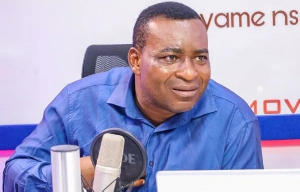The ongoing trial of Dr. Kwabena Duffuor and several other accused persons in the matter of the Republic versus Unibank has entered a new phase with the testimony of the Receiver of Unibank, Nii Amanor Dodoo. The case involves charges of fraudulent breach of trust, money laundering and other related offences.
At the time the licence of Unibank was revoked, an amount of GH¢5.7billion had been dishonestly appropriated by shareholders with the connivance and assistance of some of the accused persons, according to the Receiver’s testimony.
The Bank of Ghana (BoG), in a statement following the most recent adjournment of the case to April 18 and 19, 2023, noted that among the revelations made by Mr. Dodoo was the discovery of fictitious loans originated by the accused persons.
They include the former Executive Head of Corporate Banking, Elsie Dansoa Kyere; a former senior Relationship Manager of Corporate Banking, Jeffrey Amon; and former Executive Head of Credit Risk, Benjamin Ofori – with the approval of fellow accused persons Kwabena Duffour II and Ekow Nyarko Dadzie-Dennis.
The Receiver explained to the court that these fictitious loans were made using memoranda channelled through Mr. Amon for approval from Messers Duffour II and Nyarko Dadzie-Dennis, who were both on the board of Unibank at the time.
“The Receiver informed the court that fictitious loans were originated by the 6th accused person and one Benjamin Ofori, a former Executive Head of Credit Risk of Unibank (the 8th accused). This was done through memoranda that were channelled through Jeffrey Amon, a former senior Relationship Manager of Corporate Banking (7th accused) for approval from the 4th accused (Kwabena Duffour II) and 5th accused (Ekow Nyarko Dadzie-Dennis). The Receiver stated that these loans in question were neither channelled through the management credit committee, executive committee or the assets and liabilities committee,” the central bank noted in the statement.
The said loans were not channelled through the board as would have been expected for the volume of funds involved. Moreover, the proceeds of these loans were not credited to the customers who authored them but rather to the deferred expenditure account, with the accounts of customers listed in the memoranda being fictitious.
The loans were created using the identities of individuals who did not actually request the opening of those accounts. The bankers themselves had requested credit facilities to be transferred to those accounts. The Receiver explained to the court that these loans were invented because they had not been sanctioned by the bank’s board, which was the only body authorised to approve loans of such a significant amount.
Mr. Dodoo further stated that the fictitious loans were created to conceal money siphoned from the bank by shareholders, using the deferred expenditure account as the conduit. According to him, the shareholders funnelled funds from the bank and charges were made against the deferred expenditure account.
These charges were necessitated by the fact that the deferred expenditure account did not earn interest, and the shareholders had to find a way of creating loan accounts which would generate interest income.
During meetings, the customers in whose names the fictitious loans were to be created were identified, and the interest rates to be applied were agreed on. Following this, the quantum of loans that needed to be created was determined and signed-off on. The entries were then passed using the originating documents, which were later retrieved from the finance department by officials.
Moreover, the financial statements of Unibank did not show the actual position of the account. These transactions were concealed by creating fictitious loans, as observed by the Receiver. He stated that his team’s investigation showed that the accused persons intentionally excluded the deferred expenditure account from the financial statements, which was not only unethical but also criminal.
The Receiver also informed the court that shareholders of Unibank had initially offered to hand over assets purchased with the siphoned funds to reimburse the bank.
They later proposed to set up a special-purpose vehicle (SPV) to house those assets and use the SPV to secure loans to reimburse the bank. The shareholders had also offered to seek loans directly to pay back the siphoned funds. However, none of these proposals materialised.
The trial continues to attract attention as observers are keen to see if principal actors will be made to pay for their roles in what eventually necessitated the 2018 financial sector purge.
Watch the latest edition of BizTech and Biz Headlines below:
Business News of Saturday, 1 April 2023
Source: thebftonline.com













